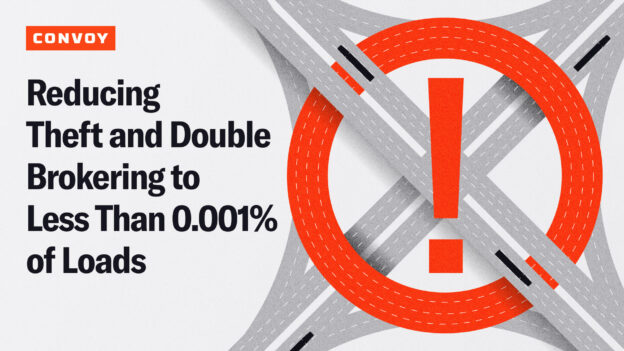How to become a shipper of choice (and why you should care!)
Shippers • Published on May 1, 2018

While the freight market upheaval has only recently made headlines, those in the industry have been feeling its effects for years. High freight volumes coupled with a nationwide driver shortage and new regulations have resulted in unprecedented volatility.
As demand outstrips supply, the balance of power has shifted to carriers, who are becoming increasingly selective about the shippers and facilities with whom they choose to work. In order to mitigate the impact of the shifting market and grow their business, shippers need to focus on becoming carrier-friendly and positioning themselves as a “shipper of choice.”
In this article, we’ve laid out steps you can take to increase the desirability of your freight, streamline your supply chain, and reduce your transportation costs to become a preferred shipper and maintain your carrier network in the shifting market.
Manage expectations and build trust with carriers
When engaging with your carrier base, it is important that you are transparent from the onset of the relationship. During your initial conversations around pricing and service expectations, be upfront about issues past carriers have had servicing certain lanes and proactively point out their operational burden. This candor builds trust with your carriers and sets a solid foundation for the partnership going forward. If you have concerns around the cost impact of this approach, know that carriers usually bake premiums into their pricing already. By setting expectations early, you can prevent service failures by helping your carriers plan ahead and avoid unforeseen issues that otherwise might cause them to reject your freight.
After the bidding and negotiation cycle, communication should be organized, consistent, and reasonable. Ensure a smooth onboarding experience by providing clear instructions for accessing 3rd party systems, details on how KPIs are calculated, and communication guidelines for key points of contact.
If possible, provide your carriers with weekly volume forecasts and refine internal processes to ensure tenders are sent with as much lead time as possible. This allows carriers to plan more effectively and source drivers ahead of time, lessening the impact of short notice tenders. Convoy’s analysis of shipments across their network indicates that the cost of truck increases exponentially for tenders received with fewer than two days notice.
Finally, it’s crucial to understand and be mindful of your carriers’ bandwidth. Aside from critical shipments, most loads do not need hourly tracking updates and check-ins. If this is something you cannot move away from, consider working with partners like Convoy who offer self-service technology that allows you to track and trace your shipments in real time, without resorting to phone or email.
Being transparent and proactively working with your carriers to tackle these important issues and align on expectations will result in improved service levels, higher tender acceptance, and a loyal carrier base that wants to partner with you for the long term. Ultimately, this helps drive stability and predictability of your cost structure.
Make your freight as desirable as possible
The enforcement of ELD limits carriers’ driving hours, giving them less flexibility than they had in the past. Coupled with increasing load-to-truck ratios, drivers are becoming more particular about the shipments they service and often factor in shipper and facility reputation when evaluating their options. Carriers prefer shipments that have desirable transit times so they can use their driving hours efficiently.
To improve your loads’ desirability, be considerate of drivers’ experiences and time when they service your freight. If there is excess transit between pick and drop locations, look into the root cause and see if you can find a direct solution. Consider optimizing appointments to better align with hours of service requirements and monitor average wait times at your facilities – if you’re currently shipping with Convoy, your account manager can help with this.
Efficient payment terms can also be advantageous as it allows carriers to avoid using costly factoring companies. Features like Convoy’s free Quick Pay and No Hassle Detention improve the carrier experience by ensuring payment within 24 hours for qualifying loads.
Little things go a long way. Having a friendly dock and security staff will not go unnoticed to carriers. Ensure staff are treating drivers the same way they would treat you. Being empathetic towards your carriers and respectful of their time will result in a more loyal and dependable carrier base, which removes uncertainty around moving your freight.
Consider long-term capital investments
Your facilities play an integral role in the overall carrier experience. Drivers prefer facilities with amenities like clean restrooms, short wait times, and the ability to park overnight. They want to to be loaded and unloaded as quickly as possible to maximize their hours of service and earning potential. Ask yourself: are there long wait times because you are understaffed or is there another underlying issue? If you were a driver, would you choose to pick or deliver at your facility?
After evaluating your infrastructure, consider solutions like hiring more employees, purchasing sufficient equipment, and evaluating dock and parking space as investments for longer-term cost savings. Extending your business hours could also mitigate overbooking that causes long wait times. In the interim, low-cost perks like clean bathrooms, free wi-fi, and waiting areas with coffee and snacks go a long way for drivers with little impact to your budget.
Communications with carriers can also be facilitated through automation and technology. For example, make it easier to schedule appointments by using online portals and consider updating your transportation management system (TMS) to make it more user-friendly and intuitive. You should also ensure the information in your TMS is updated and easily accessible, with accurate facility and contact information.
Finally, electronic data interchange (EDI) can eliminate the need to manually request information from your carriers about appointments, load updates, in/out times, and invoices. This alleviates email and phone back-and-forth and unblocks obstacles for carriers to service your freight. Investing in your infrastructure helps ease partnerships with carriers and is ultimately reflected in the rates they provide.

Why being a preferred shipper matters
In a carrier-driven market, it’s critical for shippers to make decisions focused on carriers to stay ahead of competition and maintain transportation costs. Being a shipper of choice means that carriers want to work with you because of the value your partnership provides, not because they have to.
Preferred shippers are taking conscious steps to build trust with their carriers, make their freight more desirable, and investing in their facilities and technology to streamline the shipment lifecycle. To stay competitive in a market like this one, you must be open to change, able to adapt, and willing to invest for the long term. Partnering with companies like Convoy can accelerate this process through the data and insight they’re able to provide, but ultimately becoming a shipper of choice is an ongoing process. It’s a title that’s earned by partnering closely with your carrier base to deliver significant mutual value over a sustained period of time, and if you don’t take action, you will likely be left behind.
Want to learn more? Read our whitepaper with Logistics Management about how to become a shipper of choice.



